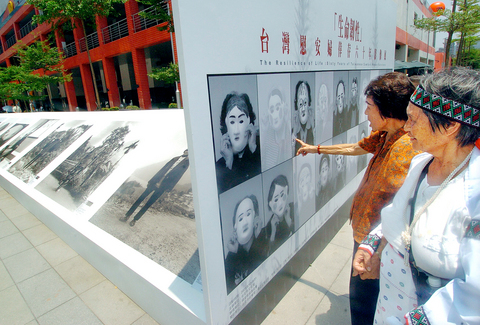Marking 60 years since the end of World War II and following the release last week of Silent Scars, a book dealing with the Japanese military's history of sexual slavery during the war, an exhibition of images entitled "The Resilience of Life: Sixty Years of Taiwanese Comfort Woman Survivors" opened in Taipei yesterday.
The exhibition will run until Aug. 31 in the pedestrian zones of Taipei Warner Village and in Ximending.
According to the organizers -- the Taiwan Women's Rescue Foundation and the Taipei City Department of Cultural Affairs -- the goal of the exhibition is to remind people of the suffering of "comfort women" and demonstrate their spirit.

PHOTO: FANG PIN-CHAO, TAIPEI TIMES
"We don't act out of anti-Japan sentiment when we hold these activities and exhibitions. However, it's all about human rights and forcing women to serve as sex slaves for troops is definitely a war crime and a violation of human rights," said Taipei Mayor Ma Ying-jeou (馬英九) yesterday at the exhibition's launch.
"In 1968, the UN's Convention on the Non-Applicability of Statutory Limitations to War Crimes and Crimes Against Humanity had already considered that war crimes and crimes against humanity are among the gravest infringements of international law. They also recognized that no expiry period should apply for lawsuits, irrespective of the date of their commission," Ma said, quoting the UN charter. He said that people should never give up trying to redress grievances.
The number of comfort women still alive to tell their story is rapidly dwindling. According to the Taiwan Women's Rescue Foundation, there are now only 30 surviving Taiwanese comfort women.
In an explanatory note accompanying the images in the exhibition, one former comfort woman recalled that she and a handful of other women were tricked into doing laundry, housekeeping and nursing chores at first, but were then forced into prostitution. Another said that they had no idea about the reality of their prison home, but they knew it was "a place for accommodating women" and only Japanese imperial troops had access to the women's quarters. Civilians were prohibited from entering.
"War is in fact a behavior stemming from patriarchy. We can easily find many examples of women being suppressed during the war. Those who suffered after the atom bombs in Hiroshima and Nagasaki received lots of attention, whereas these women with excruciating memories of sex slavery still struggle for justice," said Liao Hsien-hao (廖咸浩), head of the Taipei City Government's Department of Cultural Affairs.

An essay competition jointly organized by a local writing society and a publisher affiliated with the Chinese Communist Party (CCP) might have contravened the Act Governing Relations Between the People of the Taiwan Area and the Mainland Area (臺灣地區與大陸地區人民關係條例), the Mainland Affairs Council (MAC) said on Thursday. “In this case, the partner organization is clearly an agency under the CCP’s Fujian Provincial Committee,” MAC Deputy Minister and spokesperson Liang Wen-chieh (梁文傑) said at a news briefing in Taipei. “It also involves bringing Taiwanese students to China with all-expenses-paid arrangements to attend award ceremonies and camps,” Liang said. Those two “characteristics” are typically sufficient

A magnitude 5.9 earthquake that struck about 33km off the coast of Hualien City was the "main shock" in a series of quakes in the area, with aftershocks expected over the next three days, the Central Weather Administration (CWA) said yesterday. Prior to the magnitude 5.9 quake shaking most of Taiwan at 6:53pm yesterday, six other earthquakes stronger than a magnitude of 4, starting with a magnitude 5.5 quake at 6:09pm, occurred in the area. CWA Seismological Center Director Wu Chien-fu (吳健富) confirmed that the quakes were all part of the same series and that the magnitude 5.5 temblor was

The brilliant blue waters, thick foliage and bucolic atmosphere on this seemingly idyllic archipelago deep in the Pacific Ocean belie the key role it now plays in a titanic geopolitical struggle. Palau is again on the front line as China, and the US and its allies prepare their forces in an intensifying contest for control over the Asia-Pacific region. The democratic nation of just 17,000 people hosts US-controlled airstrips and soon-to-be-completed radar installations that the US military describes as “critical” to monitoring vast swathes of water and airspace. It is also a key piece of the second island chain, a string of

The Central Weather Administration has issued a heat alert for southeastern Taiwan, warning of temperatures as high as 36°C today, while alerting some coastal areas of strong winds later in the day. Kaohsiung’s Neimen District (內門) and Pingtung County’s Neipu Township (內埔) are under an orange heat alert, which warns of temperatures as high as 36°C for three consecutive days, the CWA said, citing southwest winds. The heat would also extend to Tainan’s Nansi (楠西) and Yujing (玉井) districts, as well as Pingtung’s Gaoshu (高樹), Yanpu (鹽埔) and Majia (瑪家) townships, it said, forecasting highs of up to 36°C in those areas